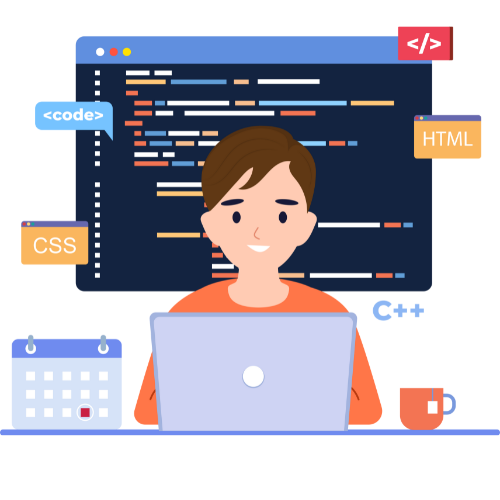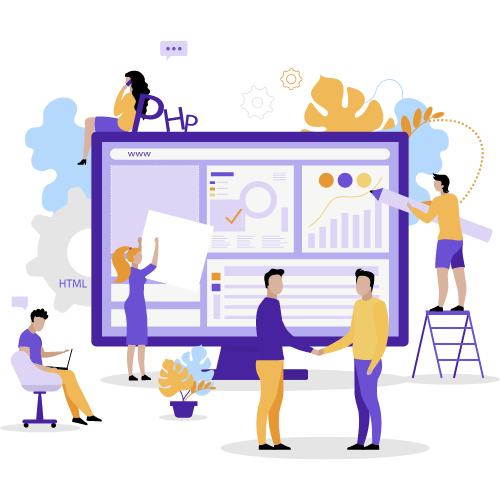Are you a digital entrepreneur planning to create your own software? Apart from other big decisions, choosing the right technology stack comes as a crucial step. What set of technologies will climb popularity ranks for your product? What tools will offer the right solution at the right time? These are some key questions to look forward to before you choose the best bet.
We know that every programming language has its own features, merits and demerits. As a software developer, you should measure opportunity costs among development speed, performance and cost and choose the right technology to develop successful applications. That being said, if performance and simple code is your preference, Python is the best choice.

Python is one of the most popular and extensively used programming languages today. According to the Tiobe Programming Index for April 2024, Python seems to hold its mojo in the present and over the upcoming future.
In this article, we’ll talk about “whats” and “whys” of Python. We’ll also explore how you should prepare yourself before starting over on a Python project and what benefits will you reap while using Python as a preferred language for your business.
So, let’s dive deep into the comprehensive guide to software development with Python.
What is Python?
As close as a textbook would define Python; it is a multi-purpose, high-level, object-oriented programming language that is interpreted, and dynamically-semantic. These jargons are hard to understand so we will break them down one-by-one.
- Multi-purpose: Python technology will make you fall in love with it due to its versatile approach. It is an ideal choice for many industries and domains such as business automation, finance, web development, machine learning, AI, and data analysis.
- High-level: Python is a high-level language that is highly abstracted from machine code and is very simple for programmers to learn and deploy. High-level languages are akin to human language, hence they make coding easier and reduce the learning curve for users. Compared to low-level technologies, they are also portable, machine-independent, and simpler to debug. Some of the commonly used high-level languages are JavaScript, Java, Visual Basic, and C#.
- Object-oriented: The object-oriented programming model primarily focuses on objects and classes, rather than functions and logics. This approach enhances reusability, scalability and efficiency. Having said that, Python still facilitates collaborative development and supports other programming paradigms.
- Interpreted: Python is an interpreted programming language, which means that its source code is translated into a simple set of instructions called “bytecode”. Bytecodes are executed by a Python virtual machine instead of the computer’s CPU. Interpreted languages are easier to develop, but rather challenging to deploy in real-time.
- Dynamic semantic: Python is dynamically semantic which simply implies that it requires less data type declarations than statically typed languages. In a dynamic semantics approach, Python performs a number of activities including code extensions and updates during runtime.
Reasons to Choose Python for Software Development
For startup owners and well-established companies such as Meta, Etsy, Spotify and Uber etc, Python is a great partner. Now, let’s explore why Python is significantly advantageous for software development.
Versatility:
Python is a versatile language and can be used in various capabilities without a hassle. It is adaptive in nature, hence can be implemented across several business aspects and industries. Python’s versatility also makes it possible to handle multiple aspects of a project without having to hire specialists, which ultimately reduces the cost of the project.

Cross-Platform Development:
Python is compatible with all platforms provided the right interpreter is installed. You can install the interpreter from Python’s official website. Additionally, Python handles various OS-specifics sensibly, while keeping the developers stress-free from the operating systems variations. Due to its cross-platform nature, it is a preferred choice for developers across the globe as it uses less resources.
Robust & Extensive Library:
One advantage of Python over other programming languages is its large and stable library. It is made up of several modules and packages that improve the functionality of your Python programme. Without writing the code, you can accomplish a given task by importing the necessary library into your code. For example, you can import the relevant library into the code to create web services while creating a web application.
Pros & Cons of Python
In this section, we’ll implore the pros of using Python as an upcoming programming language:
Python is Fast & Easy-to-Use
Python code is intrinsically fast, readable and easy-to-use. This allows developers to benefit from rapid application development (RAD) of Python, which not only makes development faster, simpler but also budget-friendly. RAD also facilitates early identification of issues, so that developers can efficiently resolve them on time.
Python Can be Used Across Wide Range of Applications
Python’s versatility is arguably its greatest commercial asset. Python is a very productive general-purpose language with many applications in several industries.
Python is frequently used in machine learning, AI, and data science projects. It can be used as a normal part of the majority of Linux and macOS distributions or as a scripting language for web applications. It is used by academic staff members for research. Additionally, Python has grown to be an essential tool for applications related to IT security, scientific computing, and the gaming sector. Naturally, enterprise software also uses the language extensively.
Python is a Comparatively Secure Language
Python has built-in security features to manage issues and vulnerabilities. As we said earl;ier, Python is an open-source language. Its open-source nature promotes transparency, which in turn, facilitates programmers working on various aspects of a project, to come together and resolve security flaws. As a result, businesses trust this great language as they are sure that their sensitive data will not be handed over to any unauthorized party.
Top Applications of Python
Now let’s have a look at a few common applications for the Python language.
- Web server programming: Django and Flask are two Python libraries that allow developers to programme server-side.
- Prototyping: With the language, developers may quickly prototype apps with ease.
- Game Development: With the aid of GUI libraries, it is frequently used to create video games.
- eCommerce: Python is used to develop powerful product recommendations, buyer data analytics, chatbot services, upselling, image recognition, cross-selling and speech recognition in the ecommerce niche.
- Healthcare services: Python aids the healthcare industry with predictive analysis, detecting and identifying symptoms at early stages of the disease, just by analyzing the medical history of the patient. AI and ML libraries of Python facilitate bed occupancy management platforms, image visualization systems and accelerate diagnostic speed, efficiency and accuracy.
- Data Science & Machine Learning: Python is the language that is most frequently used in data science and machine learning. It includes libraries for tasks involving data, such as data cleansing, data visualization, and data manipulation.
The Economy Game of Python – How Much Does it Cost to Build Python Software?
There are several factors that come into play when we talk about the cost of development. Programming language is one of them. Let’s get into the intricate details of the economy game of Python.
- An extensive range of support libraries and tools speed up coding and provide efficiency to the development process.
- Python has open licensing, which does not require any licensing fees and is cost-saving.
- It is portable and offers multi-platform support to incorporate it across various platforms – hence easier, robust and cost-friendly.
- Python offers minimal hassle and user-friendly syntax, making it faster to develop in real-time.
- Compared to other languages, the salary range for Python developers is in the middle to top range. Java, C#, and C++ developers typically make a little less money than their counterparts who are proficient at Python. Still, the language pales in comparison to the highest-earning technologies, like Perl, Go, or Scala.
Ending Notes
Reiterating the fact, Python is a high-performer programming with minimal cons in its capacity. It is simple, robust, has clear syntax and is easy to learn and deploy. Moreover, it supports its users with a great community, offering a plethora of tools, resources and libraries for almost all issues and situations.
If you have reached this point and read all through the article, it implies that you’re particularly interested to know more about Python language for software development. In that case, you would likely want to move forward with us by discussing Python for your next project. Drop us a line to consult with our experts and we’ll get back to you with extensive suggestions on how to build your procust / project with Python.







